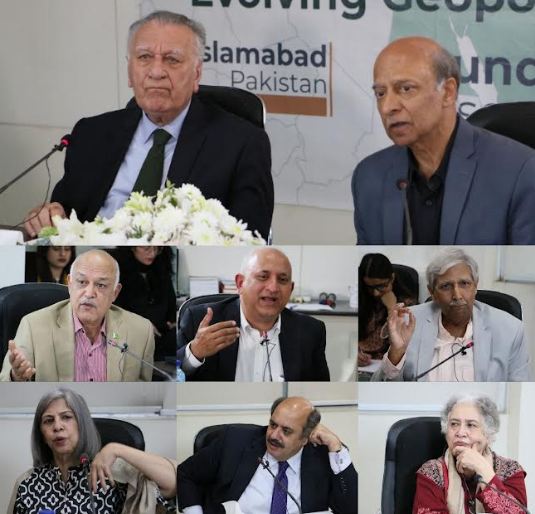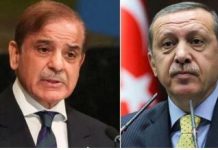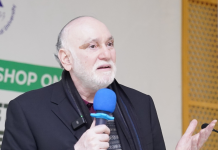ISLAMABAD, /DNA/ – The conflict in the Middle East has exposed the hypocrisy and moral corrosion of countries fuelled by transactional and self-serving interests – this notion was echoed at the roundtable on Middle East Conflict – Evolving Geopolitical Dynamics, organized by the Center for Research and Security Studies (CRSS). Participating diplomats, scholars, and policy and civil-military expertscritically evaluated the response of the Arab and Muslim world, economic and regional security implications of the conflict, the role of the United States and China, and prospects for conflict-resolution.
Former Ambassador Tasneem Aslamunderscored that the current turmoil in Gaza is not something that occurred overnight, but, in fact, the consequence of “persistent humiliation, dehumanization, and marginalization of the Palestinians”. This war – aimed at the systematic elimination of Palestinians from their homeland – will only lead to greater instability in the Middle East, while severely impacting countries like Egypt, and others too.
Highlighting a turning point in the history of global politics, the seasoned envoy added, “This conflict has shaken the conscience of people around the world. Now it is not just Arabs and Muslims vs Israelis and Jews. This war resonates with the African Americans, Latinos, the enlightened generation of Jewsliving abroad, and all those groups who have faced decades-long persecution and injustice.”
Recognizing the broader geopolitical dynamics at play, former ambassador Riffat Masood added, “The world must look at and understand this conflict in the context of Iran-US rivalry. Their historical role necessitates their inclusion and active role in the discourse for the peaceful resolution of this conflict.
Masood noted that a gradual shift in Arab nations’ ties toward Israel, and the involvement of Russia and China in the Middle East– subsequently threatening the US’ sway in the region – has played a key role in exacerbating the conflict.
Modern democracies around the world, particularly in the West, should not associate themselves with expansionist and colonizing powers. “This is a decisive moment for them – history will remember if they align with the might or logic and humanitarianism”, she concluded.
Former ambassador Shahzad Choudhry emphasized the need for a two-state solution to prevent the deterioration of the humanitarian crisis and ensure long-lasting peace. He said, “Key figures, including Biden, Netanyahu, and the Palestinian leadership could pave the way for peace through such an agreement. In that manner, we will have peace handed over to the world by a small but group of powerful and rational leaders”. “To materialize such a solution, world leaders must believe in peace and play a much-needed role in putting an end to this conflict rather than justifying the loss of innocent lives.”, he proposed.
Dr. Zafar Nawaz Jaspal, Professor at the School of Politics and International Relations, Quaid-i-Azam University said that the massive public support for Palestinians witnessed in the West following the latest conflict in the Middle East, indicates how public opinion – believed to be one of the core determinants of foreign policy decisions – has failed to influence the Western, democratically-electedgovernments.
He applauded China’s role as a global harbinger of peace given how it envisions a two-state solution as the only viable option to resolve the Palestine-Israel issue.
Haroon Sharif, former minister of state and chairman of Pakistan’s Board of Investment, opined that the self-serving economic and political interests have blinded the conscience of the countries including the ones most proximate to the conflict. These short-term transactional commercial interests have triumphed over the morality and rationality of the leadership of most of them to adopt a unified stance.
Lt. Gen (R) Asif Yaseen Malikcriticized the role of peace bodies in resolving the conflict for their casual approach and lack of strategic foresight and that Palestine holds minimal significance on their agenda. He also underscored the detrimental impact of internal divisions among Muslim and Arab nations, questioning the immediate stakeholders’ demonstration of minimal concern on the issue.
Dr. Muhammad Ali Ehsan, a postdoctoral scholar at the International Affairs Department of Kazan Federal University, Russia, highlighted that Pakistan’s unclear stance on the current turmoil stems back to a broader flaw: lack of expertise on the Middle East. He urged the concerned actors to invest in scholars, teachers, and experts at the formal education as well as foreign policy levels. Only through on-ground and critical academic intervention, we can organically understand and help address the complexities of such crises”, he concluded.
Former ambassador Qazi Humayun moderated the discussion and emphasized how the Middle East Crisis has sent shockwaves all over the world. Whether this was created by Israel to wipe off Hamas or it was something intrinsic, innocent Palestinians are paying a very big price. The response from the Arab League and OICshould have been more proactive and resolute in the interest of conflict-resolution.
The forum collectively underpinned that countries like the United States and China have a key role to play in addressing this conflict and they must encourage both parties to extend an olive branch. Shedding light on the current stance of the Biden administration and inclination towards Israel, they echoed that this has only harmed the US and EU’s global stature due to exclusionary foreign policy decisions. Such strong opposition to the US policyis being witnessed after a very long time. The same is the case with the EU. There is a lot of public pressure. Besides, the parliaments, congress, and senates are divided on the issue, calling for an immediate ceasefire.

















